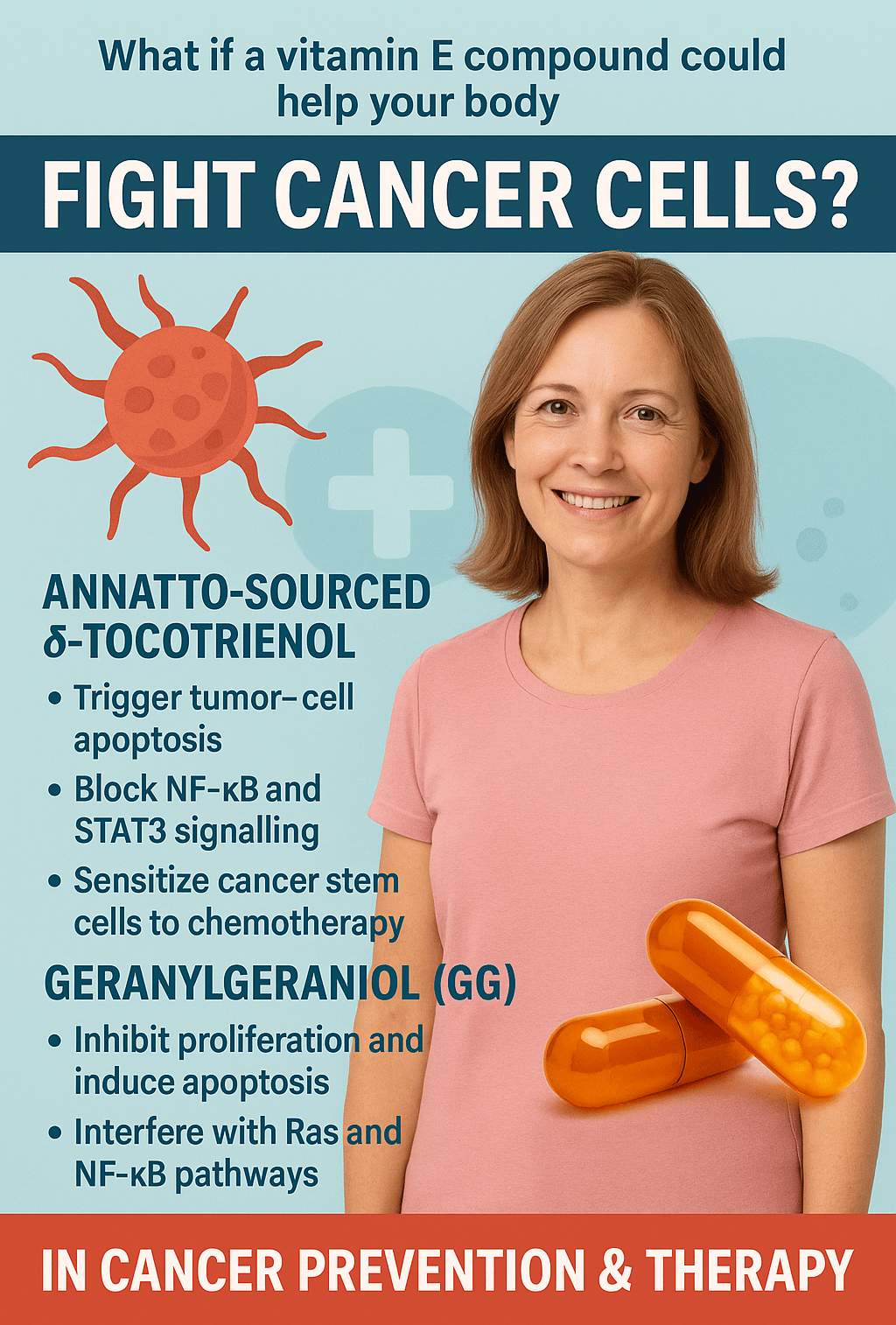Natural Cancer Remedies: δ-Tocotrienol & Geranylgeraniol
Discover the potential of natural cancer remedies like δ-tocotrienol and geranylgeraniol, which may enhance anti-cancer efficacy and reduce side effects of traditional treatments. Learn about their synergistic effects and how to integrate them into your daily regimen for improved cancer therapy.
CANCERANTI-AGEINGLONGEVITYMETABOLIC HEALTHINFLAMMATIONCELLULAR HEALTH
AlexanderJ
8/5/20252 min read


Mechanisms of Action
δ-Tocotrienol (T3)
Selective Induction of Apoptosis
Inhibition of Pro-Survival Signalling
T3 suppresses NF-κB and STAT3 pathways, key drivers of inflammation, proliferation and chemoresistance in many cancers Oxford Academic.
Chemotherapy Sensitisation
By downregulating drug-resistance proteins and blocking survival signals, T3 enhances the efficacy of agents such as doxorubicin and paclitaxel in vitro and in animal models Oxford Academic.
Geranylgeraniol (GG)
Growth Inhibition & Apoptosis
GG induces caspase-3 activation and DNA fragmentation in diverse cancer cell lines (e.g., HL-60, K562, Molt-3, COLO320) in a concentration- and time-dependent manner Oxford Academic Caring Sunshine.
Disruption of Ras & NF-κB Signalling
By interfering with prenylation of Ras and inhibiting NF-κB activation, GG undermines two pivotal pathways that cancers exploit for proliferation and survival Caring Sunshine.
Anti-Metastatic Potential
Early studies suggest GG can reduce migration and invasion of melanoma and prostate cancer cells, pointing to possible metastasis-blocking effects Spandidos Publications.
Scientific Evidence - Key Studies
Integrating into Daily Regimens
δ-Tocotrienol: 150 mg/day of a standardised annatto extract (≥90% δ-T3). For more information please visit Dosage Guidelines
Geranylgeraniol: 100–150 mg/day (purified annatto-derived GG)
Synergy: Preclinical data suggest combined T3 + GG supplementation may yield additive or synergistic anti-tumour effects MDPI.
Note: Always discuss any new supplement regimen with your healthcare professional, especially if you are undergoing conventional cancer therapies.
Safety and Considerations
Toxicity: Human trials report excellent tolerability for annatto tocotrienol up to 430 mg/day for 12 weeks, with no serious adverse events MDPI.
Drug Interactions: Tocotrienols may interfere with warfarin metabolism; GG can modulate statin efficacy, monitor closely if you are on these medications Nature.
Monitoring: Periodic liver function tests and coagulation profiles are advisable when high-dose Vitamin E derivatives are used long-term.
Conclusion
Emerging evidence positions annatto-derived δ-tocotrienol and geranylgeraniol as promising adjuncts in cancer prevention and therapy. By selectively inducing tumour-cell apoptosis, blocking survival pathways, and enhancing chemotherapy sensitivity, these natural compounds offer a dual approach, targeting cancer while safeguarding healthy tissues. As research advances toward clinical validation, δ-T3 and GG stand out as scientifically supported allies in integrative oncology.
References
D’Andrea G. Molecular Insights in the Anticancer Activity of Natural Tocotrienols. Antioxidants. 2024;14(1):115. MDPI
Kim JK, et al. Molecular Mechanism of Tocotrienol-Mediated Anticancer Effects. Nutrients. 2022;15(8):1854. MDPI
Nesaretnam K, et al. Tocotrienol as a Potential Anticancer Agent. Carcinogenesis. 2011;33(2):233–239. Oxford Academic
Eastmond DA, et al. Geranylgeraniol Is a Potent Inducer of Apoptosis in Tumor Cells. J Biol Chem. 1992;117(1):11–16. Oxford Academic
Caring Sunshine. Relationship: Cancer Prevention and Geranylgeraniol. [online] Available at: CaringSunshine.com Caring Sunshine
Arunasree KM. The Antitumor Effects of Geraniol: Modulation of Cancer Hallmarks. Int J Oncol. 2016;49(4):1491–1503. Spandidos Publications
Park HJ, et al. Synergistic Anticancer Effect of Tocotrienol Combined with Chemotherapy. Int J Mol Sci. 2016;17(10):1605. MDPI
For further reading and to explore our product range, visit Natural Health Connect.
